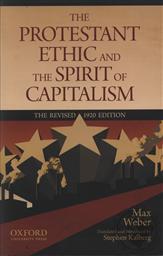The Protestant Ethic and the Spirit of Capitalism (Book/ Paperback)
by Max WeberProduct Overview
For more than 100 years, Max Weber's The Protestant Ethic and the Spirit of Capitalism has set the parameters for the debate over the origins of modern capitalism. Now more timely and thought provoking than ever, this esteemed classic of twentieth-century social science examines the deep cultural "frame of mind" that existed at the birth of modern capitalism and to this day influences attitudes toward work in northern America and Western Europe.
In this volume, Stephen Kalberg revises his internationally acclaimed translation--using shorter sentences and more lucid language--to make the work even more accessible to students and other readers. Capturing the essence of Weber's style as well as the subtlety of his descriptions and causal arguments, this is the only translation of the revised 1920 edition of The Protestant Ethic and the Spirit of Capitalism published since 1930.
To draw readers into the material, this engaging volume includes extensive introductions by the editor, a chronology of Weber's life, a glossary, and numerous clarifying endnotes. Detailed commentaries discuss the controversies Weber addressed, explain his complex causal argument by reference to the general contours of his sociology, summarize the history of "the Protestant Ethic debate," and examine the significance of "the Protestant Sects" essays.
Ideal for courses in sociology, anthropology, political science, history, international relations, economics, and cultural studies, The Protestant Ethic and the Spirit of Capitalism is an essential resource for anyone seeking to understand the origins and endurance of the modern West.
About the Author(s)
Max Weber
Karl Emil Maximilian "Max" Weber (1864-1920) was a German sociologist and political economist who profoundly influenced social theory, social research, and the discipline of sociology itself. He was a key proponent of methodological antipositivism, presenting sociology as a non-empiricist field which must study social action through interpretive means based upon understanding the meanings and purposes that individuals attach to their own actions. Weber is often cited, with Emile Durkheim and Karl Marx, as one of the three principal architects of modern social science. Weber's main intellectual concern was understanding the processes of rationalisation, secularization, and "disenchantment" that he associated with the rise of capitalism and modernity.
Our Price: $19.95
You Save:
+ Free Shipping w/ $45 min. purchase
Category: Business & Economics
Format: Book (Paperback) (442)
Publisher: Oxford University Press
Date Published: Jul 01, 2010
Language: English
ISBN: 9780199747252
SKU: LT-1652
Dimensions: 5.50 x 8.25 x 1.00 (in)
Weight: 17.70 oz










